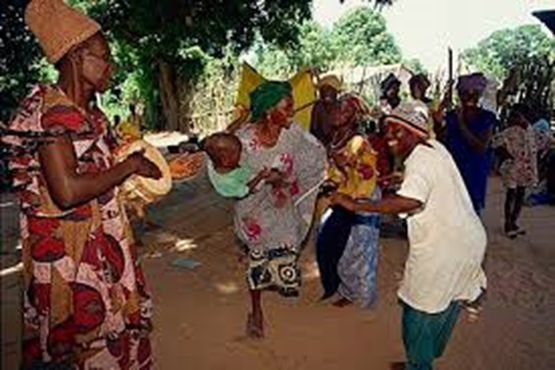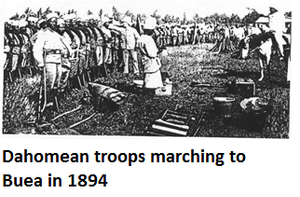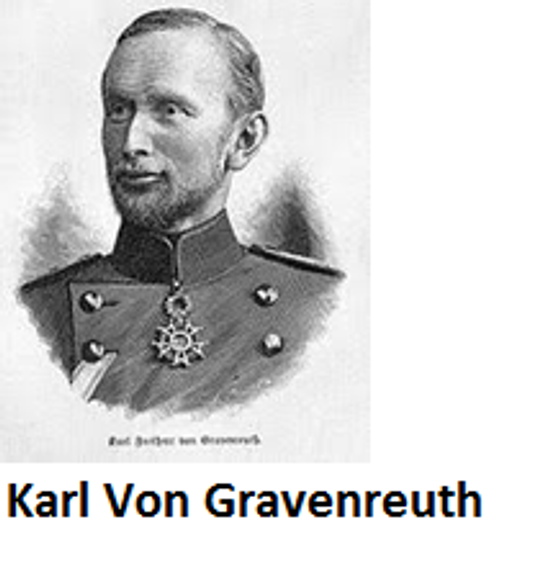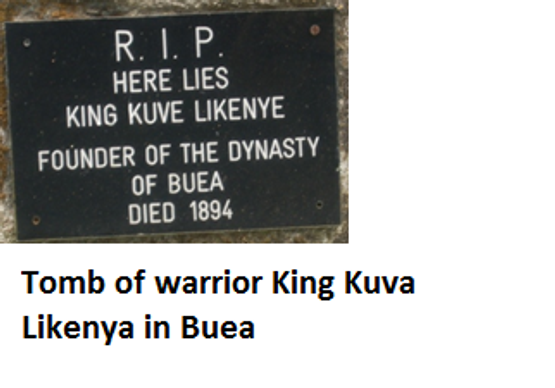ELIVE LUMA NGALE WESLEY'S PAGE


HELLO VISITORS, WELCOME TO MY PAGE/ COLUMN. MY NAME IS ELIVE LUMA NGALE WESLEY, A NATIVE OF BAKWERI LIVING IN LIMBE. I AM AN EDUCATIONIST, MUSICIAN, ARTIST AND RESEARCHER ON CULTURE, ESPECIALLY FAKO CULTURE. YOU WILL FIND BELOW SOME ARTICLES ON THE HISTORY OF THE ORIGINS OF THE BAKWERIS AND OTHER FAKO TRIBES, INCLUDING SOME CULTURAL ASPECTS OF FAKO PEOPLE. IN DUE COURSE, I WILL UPDATE YOU ON THE CULTURAL EVOLUTION OF FAKO DIVISION WHERE I WILL LOOK AT MUSIC, LITERATURE, FILMS, CULTURAL DANCES AND SPORTS.
Article 1; TRACING THE ORIGIN OF THE BAKWERI PEOPLE
The Bakweri’s use of the term Mokpela Nambongo to refer to a free-born Bakweri. This gives rise to the nomenclature whereby “Mokpeli” could be termed as child of Nambongo. Other examples may include Kul’a Kombe, meaning Kulu, son of Kombe. Ittman reports that the Bakweri’s claim the same ancestor as the Dualas.
Historical records show that the Mokpes originally came from the Bomboko (Womboko) country of the South – Western slopes of mount Cameroon. Isolated groups reached the river Mungo while others moved through the creeks where they met with Duala and Mungo fishermen, as seen in the villages of Mudeka and others that lie along the road to Douala itself. Sprouted groups also progressed in their migration and mingled with the coasters of Ambas Bay and the Mbokos.
The two villages in the Bakweri land with unusual traditions of origin are those of Maumu village, who are rumoured to come from the Songe river in the Kumba area. A similar thing also applies to those of Bonjongo (Wonjongo) village who claim to be descended from Njonge, a man from Ebonji on the creeks which is the reverse of the usual direction of migration. Apart from these two villages, all other Bakweri villages believe to be directly or indirectly from Bomboko country via the North of the mountain.
The tradition of Gbea (Buea) states that one Eyeh Njie son of Tama, and grandson of Lifanje used to come from Bomboko to hunt on the East ward side of the mountain with a friend Nakande. Nakande used to hunt near the site of the present Bonakanda (Wonakana), while Eyeh Njie moved to the Mosole (pronounced moszoleh) stream near the present Gbea. It is here that he built his first shelter (luwondo) in which he slept and smoked the meat of the animals he killed during hunting.
It was not long when Eyeh Njie decided to bring along his wives and planted gardens to his settlement he had made near the Mosole stream. He called this place ‘LIGBEA’ which means a place where work is in hand. This settlement became permanent as he was later joined by friends and relatives from Bomboko. The name of this settlement “Ligbea” was later changed to Gbea when the Germans had no place for the ‘Gb’ in their alphabets, so to ease the pronunciation, they called it Buea, as it is today.
Meanwhile, Nakande‘s settlement also became permanent as it was named Wonakanda, a name stemming from Wonya Nakande, children of Nakande.
It has also been suggested that frequent eruption on the mountain deterred the early occupation of Gbea. No record on the Mokpe people existed before 1841, when they appeared as the ‘Bakwerians’ a form of Duala name Bakwedi.
THE PATRILINEAL NATURE OF THE MOKPE EXPANSION
The genealogy of the chief’s family of Buea indicates four generations between Eyeh Njie who arrived Gbea about 1770 and Kuva Likenye who died in 1894.
The founding of new villages in the Mokpe expansion shows that one man, with a few relatives and friends could move to a place and the new settlement will be named after their leader. The prefix “wo” or the word ‘Wonya’ meaning children of or descendants of was commonly used to enable the people trace their origin.
Villages - Suspected founders or leaders
Wonjongo - Njonge, a man from Ebonji
Wonakanda - Nakande, a hunter and friend of Eyeh Njie.
Woteke - possibly Teke Mokake
Wovilla - possibly descendants of Billa Teke
Wonyanangoh - possibly Nangoh.
[[PASTING TABLES IS NOT SUPPORTED]]
Article 2; SOME BAKWERI TRADITIONAL RITES
THE BIRTH OF A FIRST BORN IN A FAMILY
A married couple in the Mokpe culture is looked upon with contempt especially if the marriage is not blessed with a child. Couples without children must wait with a lot of patience for the almighty God to answer their prayers. Newly married maidens are advised to be kind to children.
Immediately the bride becomes pregnant, jubilation starts in the family. The woman is told to refrain from strenuous activities as her progress with the pregnancy. Either her mother or mother –in –law might come to stay with her to direct and guide her on what types of herbs to use for enema (Wosongi) before putting to bed.
During labour she is taken to a native doctor or to the hospital if there is one. But in a traditional set-up, an old and experienced woman can help in the delivery. When the baby is born the proud grandmother and mother –in-law trots off to break the good news to the family. There is shouting and jubilation as they chant songs congratulating the couple “hVכmbכwכ”. Meanwhile the proud father of the baby may pick up his gun and fire shots in the air, the shots are increased if the child is a male. He is then thrown wood ash in total recognition that he has now attained manhood.
In the Bakweri tradition a man is assessed by his ability to make his wife pregnant. If he cannot he is reckoned to be an unproductive man “yukeh”.
During the ceremony, well-wishers are served with palm wine and beer pending on the real celebration of the born house.
THE BORN HOUSE:
When the lady and her child leave the hospital for home, the family and friends stream in to welcome the baby. Food is cooked especially the ‘sese’ plantain porridge spiced with enough fish and meat. Well wishers also bring gifts for the baby such as clothing, soaps, toilet tissues, food stuffs, powder or money.
One or two volunteers might decide to spend a day or two with the family doing specified chores for the ‘gbai’ new mother.
THE BIRH OF TWINS IN THE BAKWERI LAND
Twins usually called ‘maerze’ are a blessing to every family. In the past, these children were terribly maltreated and killed or abandoned in evil forest in other cultures. The Bakweris had since refrained from regarding the birth of twins as a taboo. Even though they still believe that children have supernatural powers most of them have come to stay.
In the Bakweri culture, the parents of twin are highly respected though no name stands to distinguish them from other members of the society. The grass Landers called them Tanyi (male) and Manyi “female”.
There are so many things associated with twins for example, some are said to possess snakes and other totems which could enable them bewitch anyone who tries to hurt them. They are also noticed for being connected with traditional medicine and have certain powers to cure illnesses like stiff necks, mumps, and headaches. A man who refuses to satisfy any of their requests might develop a stiff neck at night.
Despite their belief, the Mokpes generally respect twins, as they regard them as reincarnation of certain ancestors who had long died. In the case of identical twins, they are masked to avoid the confusion of identification.
CIRCUMCISION
A man is not considered a full Bakweri or Mokpe unless he has being circumcised. This process can sometimes begin at child birth, thus making it invariably the first of the rites to be accorded the new baby. It is usually fixed for the eight day after the birth of the baby.
This process in the past used to be carried out at the age of twelve and above. A native doctor is called to do the job or some specialised women who have good records in the job or some specialised women who have good records in the job. There is no point getting someone who causes extreme loss of blood or too much pain. Circumcision conducted by a woman who has no children it is believed might make the wound not to heal quickly. The older boys are compelled to the tie loin cloths so as to allow enough air in between their legs. Items used include bandages, razor blades, sassors, towel, Vaseline, engine oil etc.
During each circumcision, the parents of the child are not allowed to stay and watch it is also common after circumcision to find the bigger boys walking a funny style, which exposes them to mockery and laughter amongst their peers, who had also undergone the same ritual. The native doctor is usually paid some money for the services; meanwhile items used such as blades, towels, cotton, swabs are usually buried.
If for one reason or another a Mokpe man is not circumcised during childhood, he must do so before marriage, hence it is difficult for an uncircumcised Mokpe to get married.
VOCABULARY
Ngengu – blade
Matanga- legs
hvea – wound
Yondoh – walking


Article 3; BAKWERI- GERMAN WAR OF 1891 AND ITS IMPACT THERE AFTER
The Germans made their first expedition against Gbea in 1891 under the famous commander Von Gravenreuth, who came up with some one hundred and fifty Dahomean and Togolese troops.
The Gbea revelations of the possible causes of the war states that during this period, there was a lot of witchcraft practised by the villagers and by so doing many people lost their lives as a result of this practice. The rate of killings was alarming in all villages. In Gbea, two women who had been accused of killing a man, were immediately subjected to the ‘eku’ a sasswood or deal in which the accused was given a mixture of sasswood to drink, and if he or she vomited she was declared innocent but if no vomiting occurred the person was declared guilty and hanged immediately. Those who were not killed were banished to Victoria (Hvo) which served as a sanctuary. These events were allegedly reported to the Germans by the Basel mission catechist locally called “chicha” (Teacher) by the natives. He was strongly opposed to the witch-cleansing method of the Bakweris. A practice opposed to their Christian beliefs. The Germans therefore decided to attack Gbea and put an end to the growing threats of the Bakweris.
The news of the departure of German troops from Victoria was known in Gbea from natives of villages who had gone down to Victoria to exchange goods. The Gbea Chief Kuva Likenye also kept his men on alert, and built a barricade near a ravine situated over the dry bed of the Namonge stream near the Parliamentarian flat Hotel. Behind this ravine also was the Buea town fence which ran in an unbroken circuit for many kilometres.
In the face of such a strategy, the Dahomean troops opened fire indiscriminately against the Gbea people, who too retreated over the ravine and took position behind the fence. From this position the Bakweri opened fire after a final alert from a look-out who eventually sounded the slit drum while the soldiers had crossed the enemy the enemy lines.
During this battle Von Gravenreuth was killed with two shots on the chest by the man called Mondinde Mw’Ekeke . This was partly because of the miscalculation he made to leave behind some men and maxim guns which would have helped to crush the Bakweri. Those which were carried refused to work, partly because of the strong witchcraft from the Bakweris.
The German soldiers fled to the south west of the mountains slopes guided by Dr. Preuss. Von Schukmann; acting Governor reports that when they returned to the site, the corpse of Von Gravenreuth was in a decomposed state and it was impossible to transport it. His head was taken together with his heart and buried at the cellar of the mission.
The Bakweri victory over the Germans in 1891 brought a lot of popularity to their ruler Kuva Likenye, who was now regarded as a real King warrior. The Germans only made a repost in 1894 in an expedition this time well fortified to bring down the Bakweris to their knees.
During this attack, the Bakweri villages were destroyed, huts burnt down and cattle taken away. The extensive destruction of Gbea was a real punishment for what happened during the death of Von Gravenreuth. Kuva Likenye the chief of Buea fled to the lower Bakweris and died in exile. He was succeeded by his brother Endeley who also escaped to lower Mokunda. He was later captured and exiled to Duala, until the Buea people had to pay an indemnity.
It should be recounted that the harsh treatment method on the people by the Germans discouraged many Bakweris to learn or co-operate with the Germans. Roads were constructed using Bakweri labour; some had to carry cement on their heads from Victoria to Buea. Parents refused sending their children to school because of the harsh treatment by the Germans whom they feared could be transfered to their off springs. This partly contributes to the negative attitude of the natives towards forced labour.
To further punish the natives, the Germans used this opportunity to acquire land which they used to open up plantations of Palm, banana, rubber.
[[PASTING TABLES IS NOT SUPPORTED]]






